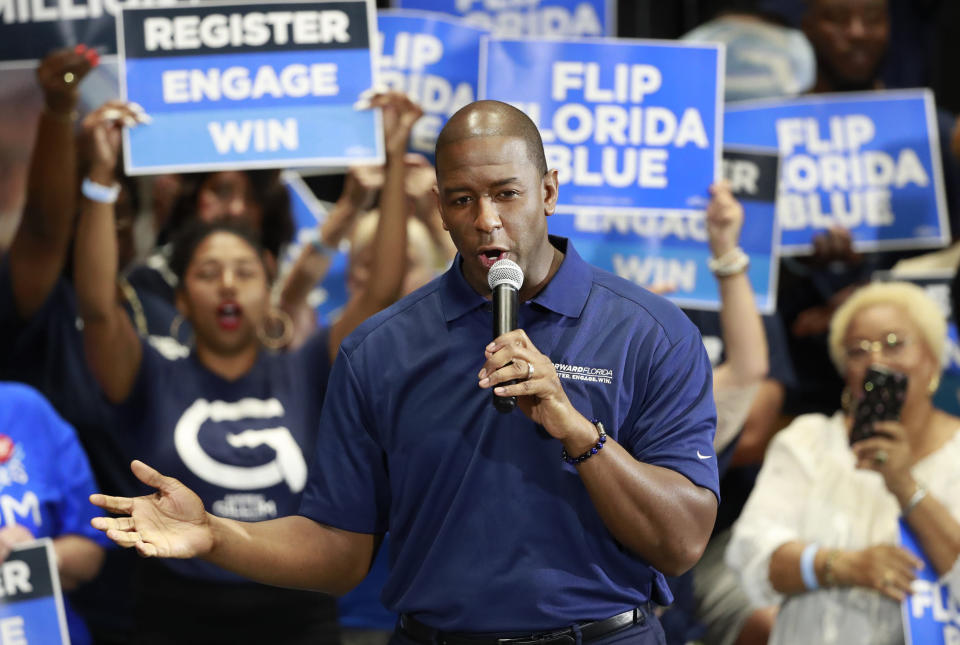Florida's Gillum calls bill to limit voting by ex-convicts a 'poll tax'
Andrew Gillum, the Tallahassee mayor who last November lost a close race to become Florida’s governor, sharply criticized new restrictions placed on voting by people with felony convictions at a congressional hearing on Monday. He said the new restrictions, passed last Friday by the Florida state legislature, amounted to a “poll tax,” one of the measures historically used in Southern states to prevent African-Americans from voting.
“The unfortunate thing” about Florida, Gillum said, was that “we almost look directly at how we disenfranchise as many people as we possibly can,” citing alleged attempts to close polling sites and dismiss absentee ballots.
Gillum made his comments at a Monday hearing of the Committee on House Administration devoted to voting rights in Florida. Gillum, a Democrat who lost in November to Rep. Ron DeSantis, now runs Bring It Home Florida, a group that seeks to register a million voters ahead of the 2020 presidential race, in which Florida will almost certainly play a critical role.
Gillum was one of several witnesses at the hearing, which was held in Fort Lauderdale. They described a variety of efforts by the state’s Republicans to disenfranchise people of color, whose share of Florida’s population has substantially increased.
Democrats say the state is still living with the aftermath of the “hanging chad” fiasco of the 2000 presidential election, when the Supreme Court halted a recount, handing George W. Bush the presidency by fewer than 1,000 votes.
“If we call ourselves a democracy, we need to act like it,” said Rep. Marcia Fudge, D-Ohio, the committee chair.
Gillum made his “poll tax” comments in response to a measure passed by the Republican-controlled Florida state legislature last week, weakening Amendment 4, a ballot initiative to allow former prisoners who have completed their sentences to vote in the state. The amendment, which would affect some 1.5 million ex-felons, passed with 65 percent of the vote in November.

The measure approved by the legislature requires ex-convicts to pay court costs, fines and victim restitution in order to return to the voting rolls, although according to the Miami Herald, a judge could waive some of these charges, or allow community service as an alternative.
An official in the communications department of the governor’s office said he was “unsure” of whether DeSantis would sign the bill. DeSantis has previously been critical of efforts to restore voting rights for people with felony convictions.
Rep. Debbie Wasserman Schultz, D-Fla., the former head of the Democratic National Committee, said she believed the legislature’s actions to have been “illegal.” She then asked Gillum if he thought the measure amounted to a “poll tax,” and whether its intention was “sowing fear and confusion among voters.”
Gillum answered affirmatively to both questions. He speculated that Republicans in the state legislature had felt “a little bit of a scare” earlier in the year, when Gillum and his organization urged people of color to go out in “droves to regain their right to vote.”
“What they’ve done at the Florida legislature sends an extremely chilling effect to people’s ability to participate in the process of voting,” Gillum said. The audience clapped in response, something almost never done at hearings held on Capitol Hill.
Gillum and Stacey Abrams, who lost her race for governor of Georgia last year, have portrayed what they call Republican voter suppression efforts in starkly racial terms that harken back to the civil rights era. She called the man who defeated her, Republican Brian Kemp, who at the time was Georgia’s secretary of state, “an architect of voter suppression that spent the last eight years knitting together a system of voter suppression that is unparalleled in America.” (Both Gillum and Abrams are African-American.)
Abrams formed a group after the election, Fair Fight Action, that filed a lawsuit against Kemp alleging he created an “obstacle course” of bureaucratic and procedural hurdles to voting that disproportionately affected the poor and people of color.
Attorneys for Georgia’s current secretary of state, Brad Raffensperger, argued in federal court last week that the suit should be dismissed.
Sen. Kamala Harris, D-Calif., who is running for president partly on a message of racial and social justice, recently said that “without voter suppression, Stacey Abrams would be the governor of Georgia; Andrew Gillum is the governor of Florida.”
Democrats in the U.S. House of Representatives recently passed a bill that would make Election Day a federal holiday and expand ballot box access in other ways. The bill is not supported by Senate Majority Leader Mitch McConnell, R-Ky.
President Trump, meanwhile, has regularly claimed that voter fraud is widespread and systematic, despite bountiful evidence to the contrary.
_____
Read more from Yahoo News:



